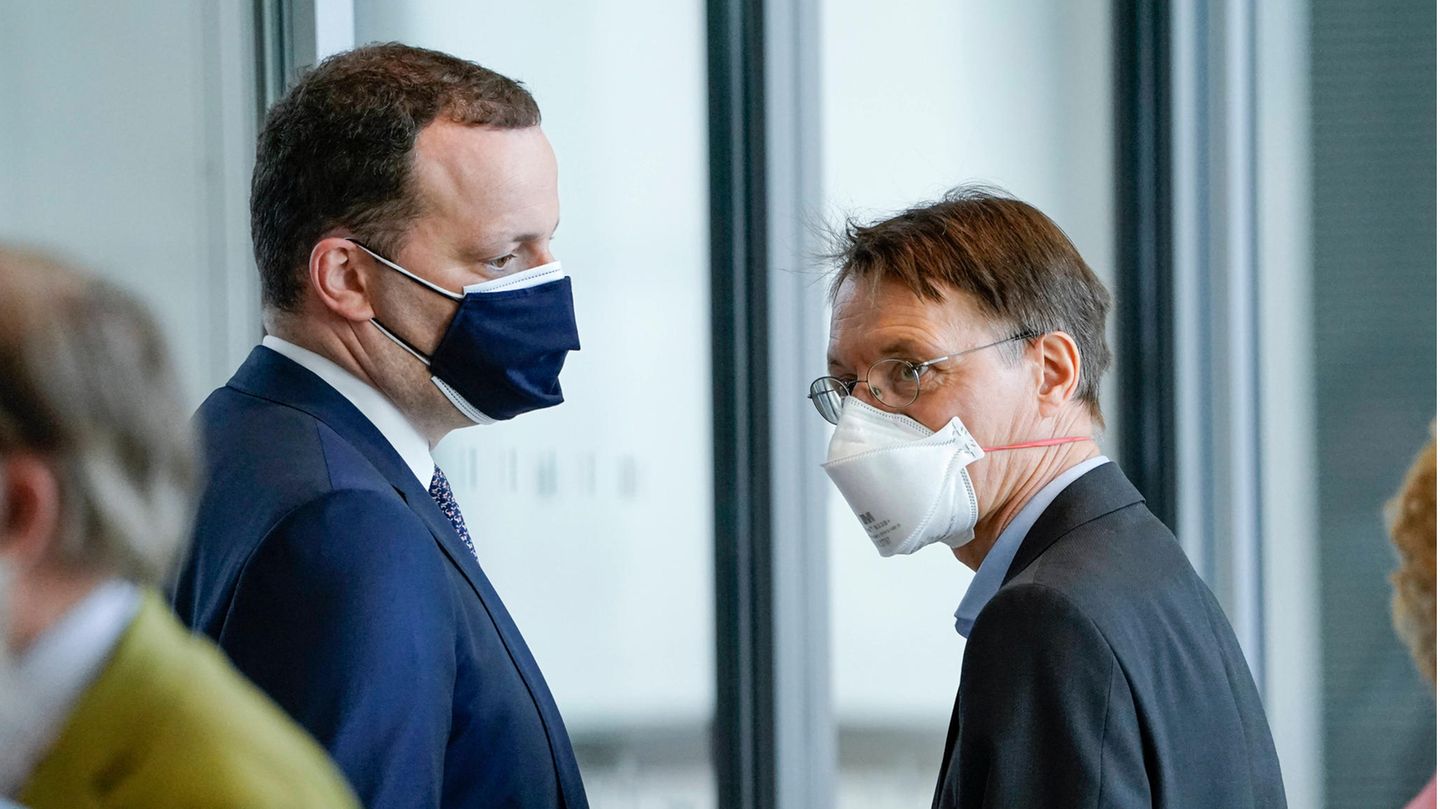The Ministry of Health is calculating that there will be significant consequential risks from purchasing masks. Almost half a billion euros could be due in 2025 alone.
This is original content from the Capital brand. This article will be available for ten days on stern.de. After that, you will find it exclusively on capital.de. Capital, like the star to RTL Germany.
The Ministry of Health suffered two serious defeats in court this summer against suppliers of protective masks for the coronavirus. For the first time, a higher court has ruled on a mask lawsuit. The rulings of the Cologne Higher Regional Court could ultimately result in the ministry’s out-of-control mask purchases at the beginning of the pandemic resulting in further significant costs for the federal government and taxpayers.
For the coming year alone, the Ministry of Health is now preparing to pay compensation to mask dealers in the hundreds of millions. This is according to a current report by the Federal Audit Office on the ministry’s budget, which Capital has seen. According to it, the department of Minister Karl Lauterbach (SPD) expects “settlement risks” from mask procurement of around 480 million euros for 2025. The financial risks are up to 120 million euros from direct contracts that the ministry, then led by Jens Spahn (CDU), concluded with mask suppliers in spring 2020. A further risk of 360 million euros is attributable to orders placed via a special purchasing procedure known as the open house procedure.
In the turbulent early days of the Corona crisis, there was a massive shortage of masks. However, the Court of Auditors later noted chaotic procedures, “massive over-procurement” and irregularities in the filing of contracts.
In particular, the open house procedure, in which the Federal Ministry of Health (BMG) was surprised by the volume of offers worth more than 6 billion euros and therefore wanted to stop it, is still the subject of numerous lawsuits by suppliers. In one of the most recently decided cases before the Cologne Higher Regional Court in July alone, the issue was a surcharge for masks worth 85 million euros, for which the federal government had refused to pay. Including default interest, the damages in this case now amount to around 118 million euros.
In fact, the BMG is even facing billions in follow-up costs from the mask deals: the value in dispute of the currently around 100 pending open house lawsuits totals 2.3 billion euros – almost ten times as much as was ultimately paid in damages for the botched car toll. These are cases in which the federal government did not pay the purchase price, citing defective or late deliveries. According to the latest decisions from Cologne, however, the contract terminations were ineffective: the BMG should have first given the suppliers a grace period to fulfill the contracts.
Only part of the disputes covered
Lauterbach’s ministry, on the other hand, is sticking to its position and is trying to challenge the two rulings of the Cologne Higher Regional Court. The judges have not allowed an appeal against their decision. But the BMG’s lawyers want to use an appeal against non-admission to get the Federal Court of Justice to deal with the mask cases. It will probably be several months before the Federal Court of Justice makes a decision, as the rulings are not yet legally binding.
As the draft budget shows, the ministry is now also making provisions for the fact that it will have to make significant payments to suppliers as early as 2025. However, the BMG’s risk forecast only covers a small part of the risks from the open house lawsuits. As the Court of Auditors notes in its report, this concerns “only a specific case constellation with a total value in dispute of EUR 270 million” and additional costs of up to EUR 90 million. These include interest payments to the plaintiffs and procedural costs such as fees for various law firms.
Specifically, the 270 million euros apparently relate to those cases in which open-house suppliers delivered masks that the federal government then rejected as defective. The far larger part of the open-house lawsuits, on the other hand, concerns cases in which no masks were delivered by the required deadline or only parts of the agreed scope of delivery were fulfilled – partly, however, because the logistics company Fiege, commissioned by the BMG to handle the process, was overloaded with the masses of masks and could not offer timely delivery slots.
In these so-called notification cases, the BMG and its lawyers probably see better cards in court, so the ministry has not yet quantified any budgetary risks in this regard. However, the Cologne Higher Regional Court found in their rulings that the BMG should have granted the suppliers at least a short grace period, even if the ministry assumed that it was a “fixed deal” with a clear deadline. The BGH will have to comment on this central issue – if it even accepts the proceedings for decision.
Ministry of Health wants to use leftover expenditure
The BMG wants to finance all follow-up costs of the mask deals from budget leftovers – i.e. from funds that were already approved in previous years for dealing with the pandemic and procuring protective equipment, but were not fully needed. According to the report of the Federal Audit Office, the ministry had a corresponding remaining expenditure of 1.6 billion euros at the beginning of 2024. This could “if necessary be used in whole or in part in the 2025 financial year”. However, Lauterbach would then have to save the corresponding amount elsewhere in projects that have already been approved by parliament, the budget controllers emphasize.
In view of the considerable budget risks, Green MP Paula Piechotta sharply criticized the mask contracts. “In the coming year alone, we will have to spend half a billion and more in tax money on Jens Spahn’s mask madness,” she said. The mask chaos was not due to the crisis, but “money was thrown out the window without a plan and without any kind of safeguard,” added the budget politician. The federal government will have to pay dearly for Spahn’s mistakes for many years to come. Possible follow-up costs for the mask deals would be “at the expense of prevention and German health insurance,” said Piechotta.
The Ministry of Health left questions from Capital about budget planning unanswered. This also leaves open the question of which specific direct purchases, outside of the open house procedure, Lauterbach’s lawyers also see “processing risks”. According to the Court of Auditors, this involves 120 million euros. At the beginning of the Corona crisis, when there was a dramatic shortage of masks because China stopped exports, the federal government had contracted masks through a whole series of purchasing channels – a total of 5.7 billion pieces for a total cost of 5.9 billion euros.
In order to obtain masks, the federal government concluded contracts with companies such as VW, Lufthansa and Otto, which have good contacts in China. At the same time, the BMG also awarded large contracts worth hundreds of millions of euros to companies that had hardly anything to do with the mask business up to that point, but had contacts with the then Minister Spahn. There are still many questions about these deals and their conspicuous conditions, especially with the Swiss company Emix Trading and the logistics company Fiege from Münsterland. The Berlin public prosecutor’s office was also interested in the deals with Emix, which were brokered by the daughter of the former CSU celebrity Gerold Tandler.
In July, after the rulings from Cologne also put the incumbent minister under pressure, Lauterbach commissioned former Secretary of State for Defense Margaretha Sudhoff (SPD) to investigate Spahn’s mask deals and their sometimes extremely poor documentation in the files. The minister announced that they would now “turn over every stone”. However, Sudhoff’s order will initially only cover the open house procedure and, according to information from Capital, will initially run until the end of this year. Lauterbach’s ministry is keeping it open whether the other mask deals will also be examined.
Source: Stern




